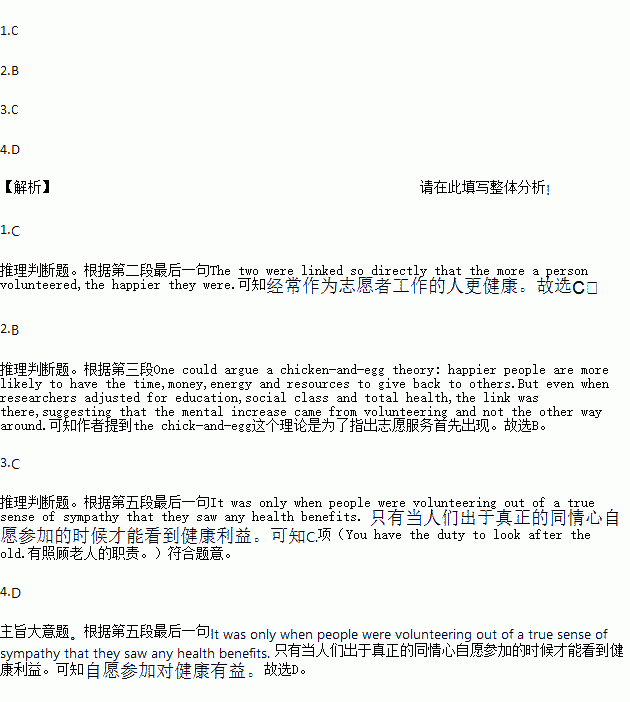题目内容
A recent study surveyed 5,000 British families about their experiences with volunteering and their mental health. Participants completed the same survey every two years from 1996 to 2008.
About 20 percent of the survey participants reported doing regular unpaid work Researchers found that these volunteers also scored highest on their mental health scores.The two were linked so directly that the more a person volunteered,the happier they were.
One could argue a chicken-and-egg theory: happier people are more likely to have the time,money,energy and resources to give back to others.But even when researchers adjusted for education,social class and total health,the link was there,suggesting that the mental increase came from volunteering and not the other way around.
According to Dr.Stephen G.Post,author of The Hidden Gifts of Helping,when you help others,your brain releases feel-good chemicals,which can help cells repair themselves and grow.And this translates to better health.
So volunteering can help improve both your physical and mental health—on one condition.You have to mean it. People who volunteered for "self-oriental" reasons,either because they were forced to do so for work or school or because they were trying to get away from problems in their lives,had a mortality(死亡率)risk that was similar to those who didn't volunteer at all.It was only when people were volunteering out of a true sense of sympathy that they saw any health benefits.
So whether it's arranging books at the library or walking dogs at the animal shelter,find a cause that's important to you and give it a try.Volunteering is a good way to develop a sense of connection that not only helps your community,but may also be good for you.
1.Who are healthier according to the study?
A. people who are happier.
B. people who are good at taking exams.
C. people that work as volunteers regularly.
D. people that make a large amount of money.
2.Why does the author mention the chick-and-egg theory?
A. To introduce a world-famous theory.
B. To point out that volunteering came first.
C. To prove happy ones would like to help others.
D. To tell us that the cause and the effect are mixed.
3.What may be one of the "self-oriented" reasons?
A. You try your best to solve others' problems.
B. You are filled with pity for the foster kids.
C. You have the duty to look after the old.
D. You're always willing to help others.
4.What is the text mainly about?
A. A chicken-and-egg theory.
B. Happiness has a lot to do with health.
C. A sense of connection is important to us.
D. Volunteering willingly is good for health.

